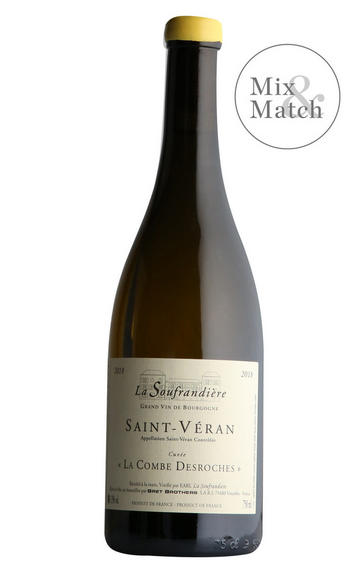
2018 St Véran, La Combe Desroches, La Soufrandière, Bret Brothers, Burgundy
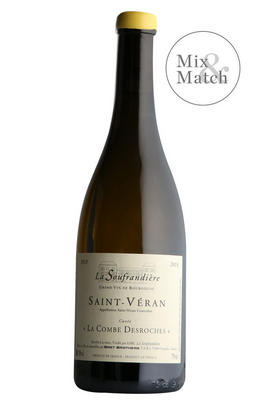
Critics reviews
La Combe Desroches is a cuvée name for this wine from the foot of the Roche de Vergisson. Bottled. Really chalky, sculpted, minerally wine. So delicate and dense and amazingly tense. Really exciting.
Drink 2023 - 2032
Jancis Robinson MW, jancisrobinson.com (January 2020)
About this WINE
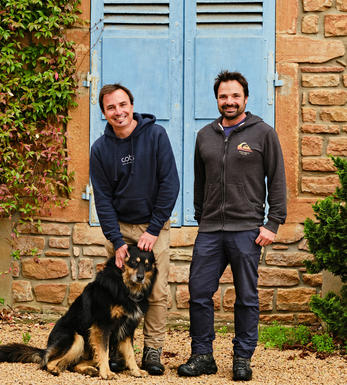
Bret Bros.
Grandfather Bret bought this property in Vinzelles in 1947. In 2000 Jean-Philippe and Jean-Guillaume Bret took their vineyards out of the local co-operative and established their Domaine de la Soufrandière (see here for the wine selection from la Soufrandière) with 4 hectares of vines entirely in the appellation of Pouilly Vinzelles. They have also developed a negociant activity using the name Bret Brothers.
Previous experience between them includes stages at Ridge and Newton in California and Comte Lafon in Burgundy. Most of their vines are in a perfectly situated east facing slope of Vinzelles called Les Quarts, on Bajocian limestone with a high silica/quartz content.
The vineyards have been farmed organically since 2000, with biodynamic principles being progressively introduced. The grapes, both their own and those purchased, are picked in small containers, then whole bunch pressed in the tinailler (local Maconnais and Beaujolais word for cuverie) before descending by gravity to the barrel cellar. They are currently all taken out of barrel for bottling after 11 months.
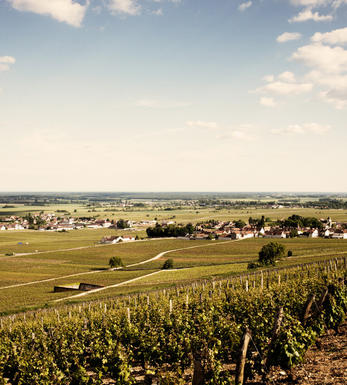
Saint-Véran
Saint-Véran is the southernmost appellation of the Mâconnais region of Burgundy, and consists of two areas, divided by the lands of Pouilly-Fuissé, that produce a dry white wine. Named after the town of Saint-Vérand which is included inside its jurisdiction, an administrative error in 1971, the year of the formation of the AOC, meant that Saint-Véran lost the‘d’ at the end of its name.
Saint-Véran produces both white and red wines, but due to its unique position as the most southern appellation of Burgundy, it technically overlaps into the northern boundary of Beaujolais, meaning that some of its communes produce reds to be sold as Beaujolais Cru, but whites to be sold as Burgundian, due to the inferred superiority over the more generic Beaujolais Blanc AOC.
Saint-Véran whites are generally well-regarded amongst the wine community, indeed their qualities were realised prior to its official classification as an appellation in 1971 by many aficionados.
They are all made from Chardonnay variety in the customary Burgundy fashion, but are known to be slightly more full-bodied than other varieties of white Burgundy. Notable changes occur during aging: Saint-Véran whites go from a floral and fruity youth to a nuttier and honeyed maturity. As with many wines from the Mâconnais region they also often display notes of minerality, something which is greatly desired.
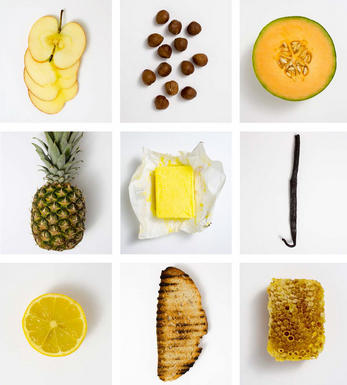
Chardonnay
Chardonnay is often seen as the king of white wine grapes and one of the most widely planted in the world It is suited to a wide variety of soils, though it excels in soils with a high limestone content as found in Champagne, Chablis, and the Côte D`Or.
Burgundy is Chardonnay's spiritual home and the best White Burgundies are dry, rich, honeyed wines with marvellous poise, elegance and balance. They are unquestionably the finest dry white wines in the world. Chardonnay plays a crucial role in the Champagne blend, providing structure and finesse, and is the sole grape in Blanc de Blancs.
It is quantitatively important in California and Australia, is widely planted in Chile and South Africa, and is the second most widely planted grape in New Zealand. In warm climates Chardonnay has a tendency to develop very high sugar levels during the final stages of ripening and this can occur at the expense of acidity. Late picking is a common problem and can result in blowsy and flabby wines that lack structure and definition.
Recently in the New World, we have seen a move towards more elegant, better- balanced and less oak-driven Chardonnays, and this is to be welcomed.


Buying options
Add to wishlist
Description
Located at the foot of the north side of the Roche de Vergisson, this is a cool site which has come into its own in recent warm vintages. Most (80%) of the wine went to tank, while the remaining 20% went to barrel. Fresh and juicy, this has a charming nose of white flowers and orchard fruit, and the palate has crisp apple flavours and crunchy acidity.
Drink now to 2024
wine at a glance
Delivery and quality guarantee